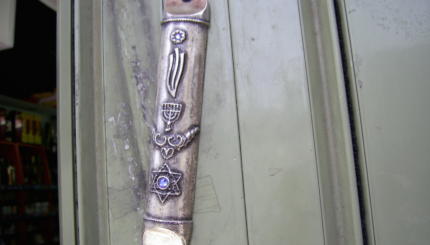Despite its title, Israel Shahak’s Jewish History, Jewish Religion (1994) is not your average intro-to-Judaism book. It is more likely to be found in a Muslim day school in Damascus than a Jewish day school in New York, more likely to be cited on a neo-Nazi website, than your local synagogue’s.
Shahak’s book is an overview of Judaism and Zionism, which focuses on Jewish anti-Gentile traditions. Though he recognizes that many of these teachings are no longer authoritative, Shahak believes that they have, nonetheless, had a profound influence on the development of Jewish identity over the centuries. Most importantly, he believes that they have seeped into Zionist ideology and have affected the way Israel interacts with its non-Jewish citizens and neighbors.
Shahak, a Holocaust survivor who died in 2001, was for many years a professor of chemistry at the Hebrew University in Jerusalem. He also led the Israeli Civil Rights League from the mid-1970s until 1990. In Israel, he was a controversial figure, but he was revered by the international left as a tireless advocate for human rights.
Are Jewish Lives Worth More?
In Jewish History, Jewish Religion Shahak brings numerous texts and legal rulings to demonstrate Jewish antipathy to non-Jews. He mentions a passage from the Talmud that says that Jesus will be punished in hell by being immersed in boiling excrement. He relates that Jewish tradition teaches pious Jews to burn copies of the New Testament and curse the mothers of the dead when passing non-Jewish cemeteries. Shahak highlights the famous passage from Leviticus commanding Jews to "love thy neighbor as thyself" and mentions that, according to rabbinic interpretation, "thy neighbor" refers only to Jews.
With your help, My Jewish Learning can provide endless opportunities for learning, connection and discovery.
Shahak further suggests that the Jewish tradition values Jewish life more than Gentile life. He cites Maimonides’ assertion that whereas one who murders a Jew is subject to the death penalty, one who murders a non-Jew is not (Mishneh Torah, Laws of Murder 2:11). According to another leading commentator, indirectly causing the death of a non-Jew is no sin at all (Rabbi Yoel Sirkis, Bayit Hadash, commentary on Bet Yosef, Yoreh Deah 158).
Shahak reiterates the well-known Jewish teaching that the duty to save a life supersedes all other obligations and notes that the rabbis interpreted this to apply to Jews only. According to the Talmud, "Gentiles are neither to be lifted [out of a well] nor hauled down [into it]" (Tractate Avodah Zarah, 26b). Maimonides writes: "As for Gentiles with whom we are not at war…their death must not be caused, but it is forbidden to save them if they are at the point of death; if, for example, one of them is seen falling into the sea, he should not be rescued, for it is written: ‘neither shalt thou stand against the blood of thy fellow’–but [a Gentile] is not thy fellow" (Mishneh Torah, Laws of Murder 4:11).
Indeed, Maimonides is the focus of much of Shahak’s analysis. Shahak believes that the 12th-century philosopher and talmudist was a Gentile-hater and racist. He quotes Maimonides’ statement that, "their [the Turks and the blacks] nature is like the nature of mute animals, and according to my opinion they are not on the level of human beings" (Guide For the Perplexed, Book III, Chapter 51).
Practical Ramifications
Shahak recognizes that many of these traditions are not followed in practice, but he believes that, in general, they have been covered up, instead of confronted. In support of this claim, he refers to another a violent passage from Maimonides that is not translated in the bilingual addition of the Guide published in Jerusalem in 1962. He sees this as a deliberate deception on the part of the editors to soften classical Jewish militancy. His own English translation of the passage, which discusses the command to kill Jewish infidels reads: "It is a duty to exterminate them with one’s own hands. Such as Jesus of Nazareth and his pupils, and Tzadoq and Baitos [the founders of the Sadducees] and their pupils, may the name of the wicked rot."
According to Shahak, Jewish "traditions of contempt" infiltrated Zionism and have affected Israeli policy towards its Arab citizens and the Palestinians. He cites three main areas where he believes this has occurred: residency rights, employment rights, and equality before the law.
As an example, he mentions that 92% of Israel’s land is legally restricted to Jews. While in other countries it would be labeled anti-Semitic if a policy excluded Jews from living on or owning land, in the Israeli context Jews tolerate it. He adds that based on the distinction in classical Judaism between reverence for Jewish cemeteries and not for non-Jewish ones, the state of Israel has destroyed hundreds of Muslim cemeteries, including one in order to build the Hilton Hotel in Tel Aviv.
Perhaps most disturbingly, Shahak cites a booklet published by the Central Regional Command of the Israeli Army which states that it is permissible, and even encouraged, to kill civilians encountered in war. "In war, when our forces storm the enemy, they are allowed and even enjoined by the Halakhah to kill even good civilians, that is, civilians who are ostensibly good." In a footnote, Shahak mentions that this booklet was withdrawn from circulation on the command of the Chief of Staff, but he nonetheless, believes that even the brief appearance of such a text can only be explained by an accurate assessment of the inequality in Jewish tradition between the lives of Jews and non-Jews.
Jews Have Ignored Shahak’s Work, Others Haven’t
Whatever your opinion of Shahak and his arguments, Jewish History, Jewish Religion should be taken seriously for a number of reasons.
For one, the texts that Shahak cites are real (though Shahak’s sporadic use of footnotes makes it difficult to check all of them). Oftentimes, the interpretation of these texts is debatable and their prominence in Judaism negligible, but nonetheless, they are part of Jewish tradition and, therefore, cannot be ignored. And, indeed, they are not ignored. As alluded to above, Shahak’s work is very popular in both Arab and Muslim circles (Radio Islam contains the full text of Shahak’s work) as well as groups that are often openly anti-Semitic (David Duke and Bradley Smith include Shahak’s book on their websites).
Others use Shahak’s work in their presentation of Judaism, and that fact alone should make it relevant to contemporary Jews.
Shahak was an ardent secularist and anti-Zionist, but he wrote his book as a challenge to Jews to engage the chauvinist, dehumanizing elements of Jewish tradition and to help create a self-critical and sensitive modern Judaism. It’s true that he combed the rabbinic tradition in search of hateful passages, often–though by no means always–misinterpreting them and taking them out of context, but this may be beside the point.
Jewish texts exist that can be–and are–understood to be vehemently xenophobic. These texts must be openly and honestly grappled with, explained, and if necessary, repudiated.
Talmud
Pronounced: TALL-mud, Origin: Hebrew, the set of teachings and commentaries on the Torah that form the basis for Jewish law. Comprised of the Mishnah and the Gemara, it contains the opinions of thousands of rabbis from different periods in Jewish history.


